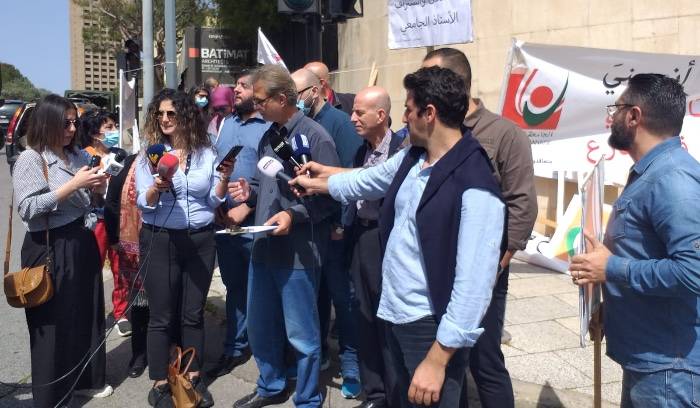
Lebanese University contract lecturers speak to the press during a protest in front of the Grand Serail in April. (Credit: NNA)
Lebanon is once again a lower middle-income economy. The World Bank said so, it already hinted at the downgrade back in April 2021. The bank is in fact 24 years late, it overlooked 24 years of lies and financial deceptions. What’s the use in more rankings, you would say, when reality is staring us right in the face?
Do you need an “Ikhraj Eid” (extract of civil registry)? Sorry, it’s not possible. Do you need a passport? Sorry, it’s not possible. The public sector is collapsing as employees continue in their fifth week of an open-ended strike. Everyone is striking. Ogero employees, the Lebanese University’s professors, technicians at Beirut airport, and workers at the state-run National News Agency were all recently on strike. The problem is that they are still being paid in lira. It is the government’s cowardly strategy of reducing the sector’s headcount through attrition. Expenses will definitely drop, but so will revenues. Where are the thinking heads? And they say they want to approve the 2022 budget! With what numbers? More made up ones.
However, one group managed to buck the trend and strong-armed or cajoled Banque du Liban — we will never know — into raising their salaries. Apparently, judges and MPs have been allowed to withdraw their salaries at a rate of LL8,000 rather than at the official rate of LL1,500. No one knows how, no one knows why. BDL denied knowledge of such a policy, Mount Lebanon Public Prosecutor Ghada Aoun criticized the move, and Parliament Speaker Nabih Berri said “This disparity will lead to collapses far worse than the current economic and financial disasters.”
Furthermore, the bidding for the management of the Beirut international airport’s duty-free shopping was canceled, after the Directorate General of Civil Aviation received only one offer.
We have repeatedly highlighted the impact of Russia’s war on Ukraine on commodity prices. However, it is important to note that for the last two months, prices have reversed by a meaningful margin.
What follows is a rundown of major commodity prices’ performances. Brent crude oil is down by 19.46 percent since mid-June while ultra-low sulfur diesel dropped by 20.47 percent. Wheat is down by 38.21 percent since mid-May, while the dry Baltic index — average prices paid for the transport of dry bulk materials across more than 20 routes — is down by 36.18 percent.
Meanwhile in Lebanon, between June 14 and July 15, the price of 20 liters of 95- and 98-octane gasoline decreased by just 8.6 percent and 8.32 percent and the price of 20 liters of diesel dropped by just 4.66 percent. The lira remained steady against the dollar in the parallel market during the same period, strengthening on average by 0.85 percent.
As to the US President Joe Biden’s trip to Israel and Saudi Arabia, we offer no comment. We just hope the joint statement after the Jeddah summit calling for the formation of a new government and the implementation of structural and global reforms will be heeded like it always is (no really!). There is no place for skeptics like caretaker Information Minister Ziad Makari.
And while we are at it, and since we have done a great job with one Beirut municipality, now, we need to have two municipalities. Just give us two of everything.
Qana versus Karish? Are we ready for war? Hezbollah’s parliamentary bloc leader MP Mohammad Raad said Hezbollah does not want a war, but it is ready and on alert. Do you need a passport? Sorry, it’s not possible. You have to stay behind to see how the situation plays out.
Positive news of the week: Ukraine, a country devastated by war, is offering scholarships to Lebanese students. Humanity is not dead yet. Meanwhile, the Finance and Budget Committee is meeting today to approve amendments to the banking secrecy law after changes were ratified last week by the subcommittee.
Until next week.